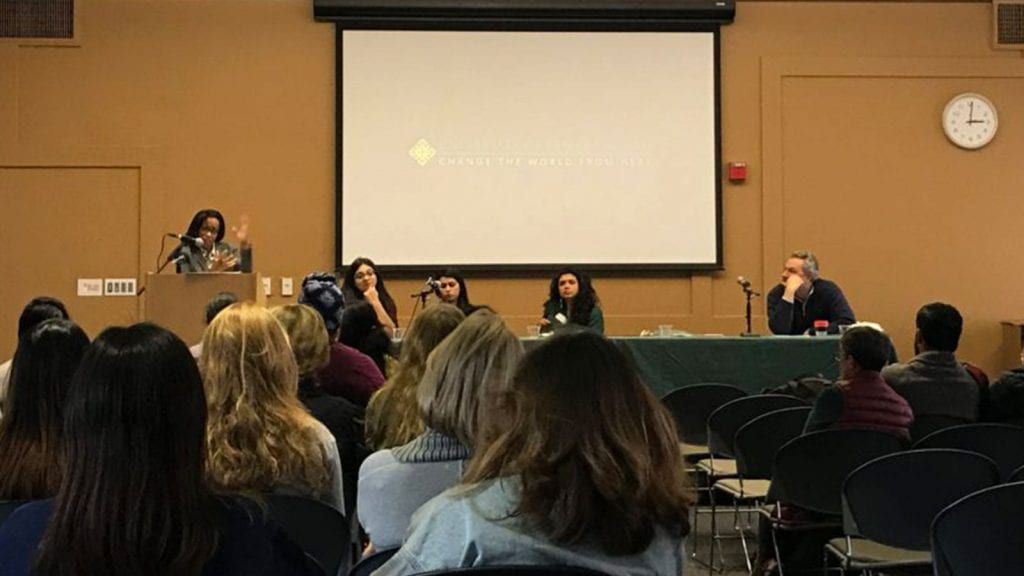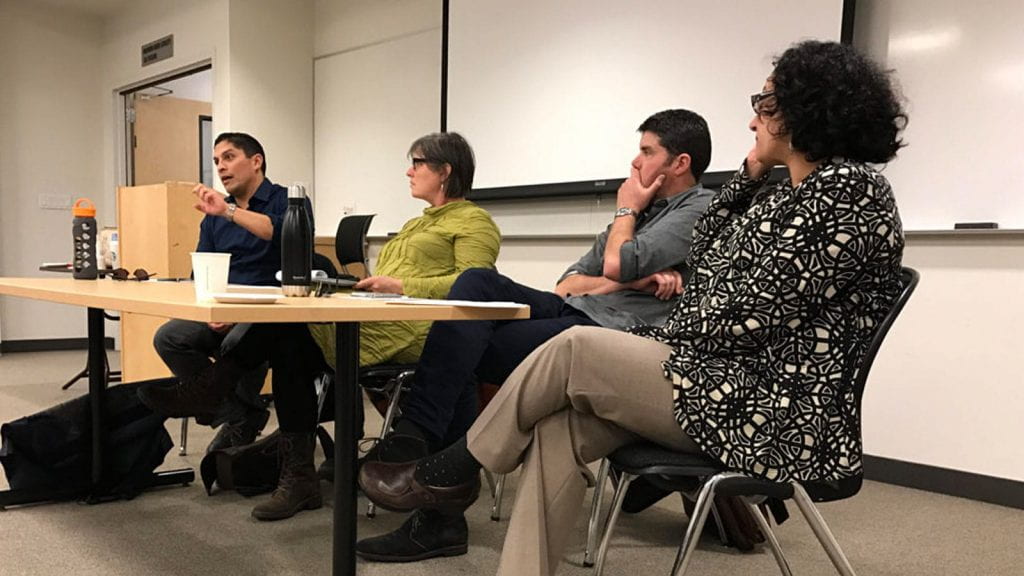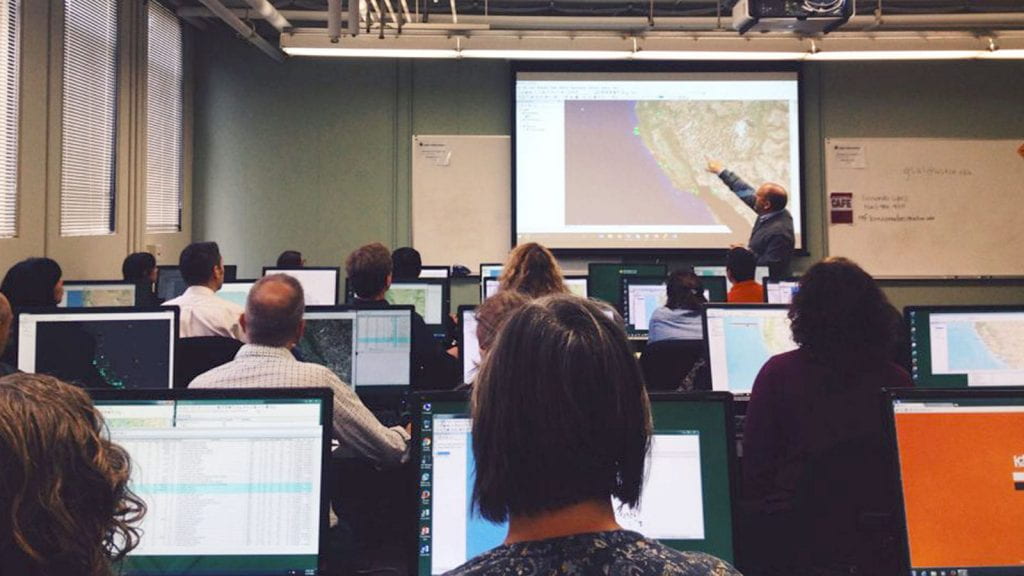The Implications of the Trump Presidential Administration: CRASE-sponsored symposium and workshop
- Organized by:
Professor Liat Berdugo, Art + Architecture, lberdugo@usfca.edu
Professor Rachel Beth Egenhoefer, Art + Architecture, rbegenhoefer@usfca.edu
Professor Sumer Seiki, Teacher Education, sseiki@usfca.edu
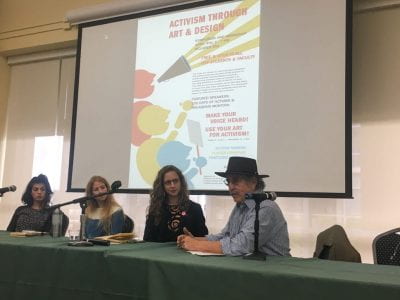
The day after President Trump’s inauguration, millions gathered all over the nation to protest in organized Women’s Marches. During these marches, many participants donned knitted pink hats with cat-like ears — dubbed the “pussyhat”— as a home-made, crafted statement of protest against Trump’s “Make America Great Again” cap and his platform more broadly. Others carried signs and wore messages on their shirts as a visual display of voice.
As professors in Design and Teacher Education, we see these protest objects drawing from a long tradition of art, craft, and design made for activist purposes. Now, more than ever, the urgent issue we face as citizens is: how can we make our voices seen and heard?
As designers, we think about how visual and artistic tools can amplify our voices and to take action. At a time in which the Trump administration is actively threatening the core values of our USF community, what is the potential significance and power of art, craft, design, and visual symbolism in resistance? How can design be social protest?
Inspired by other groups that encourage both dialogue and political action, we held a symposium discussion and workshop event on activism through art and design. This event took place on April 4, 2017, and included an hour-long panel discussion with artist Malaquais Montoya and three members of the art activist group 100 Days Action – Ingrid Rojas Contreras, Alicia Escott, and Katina Papson-Rigby.
Directly following the panel, faculty, speakers and students alike took part in an hour-long workshop in which students identified issues of concern and created their own visual activist messages in the form of buttons, post cards and other visual works. Students had an opportunity to explore the ways they too could make their own voices seen and heard with a mentor activist artist. Throughout the hour, our community grew stronger through conversation, which was as important to the works created. The journey as individuals and as a community continues, the work is not done.
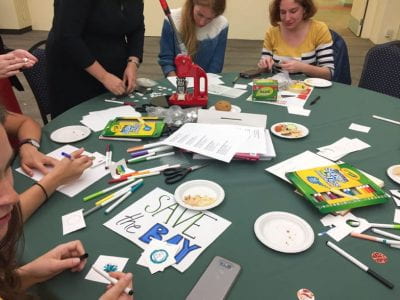
Symposium Panelists
Art is Malaquias Montoya’s strongest voice. He has used silkscreening, poster making, and mural painting, for decades to communicate the silent and often ignored experiences of Chicano, Mexican and Central American working class, and other disenfranchised people of the world. Art also allows him to awaken his own consciousness, to reveal a diverse reality and to actively work to transform it. What better function for art at this time? A voice for the voiceless. Montoya is credited by historians as one of the founders of the social serigraphy movement in the San Francisco Bay Area in the mid-1960’s. Montoya’s unique visual expression is an art of protest, depicting the resistance and strength of humanity in the face of injustice and the necessity to unite behind that struggle.
Montoya has lectured and taught at numerous colleges and universities in the San Francisco Bay Area including Stanford and the University of California, Berkeley. Since 1989 Montoya has held a professorship at the University of California, Davis, teaching both in the department of Art and the department of Chicana/o Studies.
100 Days Action
100 Days Action is a counter-narrative to the Trump administration’s one hundred day plan. 100 Days Action is a San-Francisco-based calendar of activist and artistic strategy, and a call to thinkers, artists, and writers to propose gestures that can be carried out either at home or in the world. It’s partnering with many important arts organizations, such as Southern Exposure Gallery, Yerba Buena Center for the Arts, and KQED Arts. 100 Days Action will be represented by three of its organizing artists:
Ingrid Rojas Contreras was born in Bogotá, Colombia. Her essays and short stories have appeared in the Los Angeles Review of Books, Electric Literature, and Guernica, and anthologized in Guernica Annual (Haymarket Books), Wise Latinas (Nebraska U. Press) and American Odysseys: Writings by New Americans (Dalkey Archive Press). She is the 2014 recipient of the San Francisco Foundation’s Mary Tanenbaum award for non-fiction. She has received scholarships and support from Hedgebrook, Bread Loaf Writer’s Conference, The Camargo Foundation, Djerassi Artist Residency Program, and the National Association of Latino Arts and Culture. She writes the Book Spine column for KQED. Her debut novel, The Fruit of the Drunken Tree, is forthcoming from Doubleday in 2018.
Alicia Escott is an artist based in San Francisco whose work has dealt with issues of environmental degradation for over 15 years. Her work addresses issues of species-loss, the processes of commercial mediation in late-capitalist society, as well as the individual and collective experience of loss, heartbreak and longing. Her thinking focuses on grappling with what it is to live a human life amid a moment that is profoundly rare in the geologic history of the planet. She is interested in how we each are negotiating our immediate day-to-day realities and responsibilities amid an awareness of the overarching specter of climate change, mass-extinction and other Anthropocenic events. She approaches these issues with an interstitial practice that encompasses writing, drawing, painting, photography, video, sculpture, social-practice and activism with a focus on tailoring the medium to the issue. Escott holds an MFA from CCA, where she received the Richard K. Price Scholarship and a BFA from the Art Institute of Chicago. Escott has been a fellow at Djerassi, Anderson Ranch Arts Center and the JB Blunk Artist Residency. Her work has been shown in over 75 art institutions, galleries and alternative spaces, and included in exhibitions at the Headlands Center for the Arts, the Hayward Gallery in London, the Berkeley Arts Center, Yerba Buena Center for the Arts, and in the San Francisco Maritime Museum.
Katina Papson-Rigby is an interdisciplinary artist and educator based in San Francisco, CA. She employs the tools of progressive education, time-based media, and poetry in her performances and videos. Inquiry, dialogue and storytelling are a through line in much of her work. Katina holds two Bachelors of Fine Arts from the University of Massachusetts Amherst, one in Computer Design & Photography and the other in K-12 Art Education. She received her Masters of Fine Arts in Media Arts from the California College of the Arts in 2007. Her work has been featured in exhibitions in San Francisco, CA at SOMArts, Southern Exposure, Yerba Buena Center for the Arts, and the Whitney Museum in New York. She has devoted much of her professional life to advocating for equity and inclusion, has published with multicultural education scholar Sonia Nieto through Teachers College Press, and sits on the board of People of Color In Independent Schools of Northern California (POCIS). The pronouns Katina uses are she/her/hers, she identifies as mixed, and is a proud Bronx, New York native.
